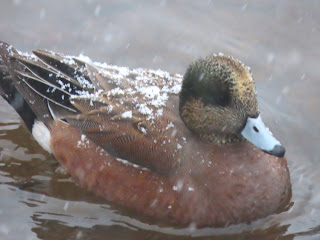NATURE MONCTON NATURE INFORMATION LINE
Jan 9, 2022 (Sunday)
To respond
by e-mail, please address your message to the information line editor, nelsonpoirier435@gmail.com .
Please
advise the editor at nelsonpoirier435@gmail.com
if any errors are noted in wording or photo labelling.
For more information on Nature Moncton, check the
website at www.naturemoncton.com
Edited by:
Nelson Poirier nelsonpoirier435@gmail.com
**Kathie Carter updates on the female Western Tanager that continues to be a patron at her Moncton feeder yard. The only feeder she uses was missing Saturday morning, blown down in the storm. Kathie managed to find it and refilled it with a fresh suet block (fruit & nut), sunflower chips, nyjer, a bit of cracked corn and 2 crumbled up cookies leftover from Christmas. She cleaned out and refilled the rest of the feeders as well and getting filled a coiled wreath-shaped suet/peanut feeder with torn up rolls & bread. The first birds back were a Black-capped Chickadee and a handful of American Goldfinch. As soon as they disappeared the Western Tanager flew in and went straight to the bread. It’s hung in a way that she can sit in the tree and peck away. She also went to her usual smorgasbord feeder. Kathie comments “Now, if she can just survive the cold temperatures coming next week”.
A male Western Tanager
that visited New Brunswick some years ago successfully survived the cold period.
**Cathy Simon enjoyed a walk in Mapleton Park
at the beginning of January 7th's storm. She was surprised to find a pair of AMERICAN
WIGEON swimming amongst all the Mallard Ducks. In addition, the AMERICAN
GOLDFINCHES were not deterred by the storm's snow and wind.
**There appears to be a
surprising number of bird species enjoying the bountiful fruit crop we have
this year. Krista Doyle photographed a flock of Blue Jays checking out
what appears to be winter clinging crab apples.
**I expect most folks found their birdfeeder yards
quite busy after the storm on Friday. A few interesting visitors at my own
feeders were a male Northern Flicker and a juvenile Sharp-shinned Hawk.
There was a variety of suet blends and peanut butter available,
but the Northern Flicker chose to go between 2 roofed over feeders (courtesy of
Fred Dube’s workshop) containing sunflower chips.
The Sharp-shinned Hawk showed its juvenile hunting
ability. It perched in a tree above the feeders waiting for a bird to arrive.
As expected, no bird came near with a raptor perched in plain sight over the
feeders. It waited for approximately 20 minutes and left. Within minutes, all
the regular patrons returned.
The yellow eye, brown plumage, and vertically streaked
breast labelled it as a immature.
Nelson Poirier
Nature Moncton








